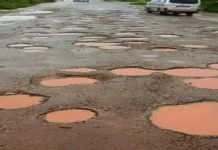Itai Ndongwe
HARARE – The Japanese government has extended a grant of US$ 17.4 million to Zimbabwe for upgrading of high gradients on the Makuti-Chirundu stretch under Phase 2 of the Road Improvement of the Northern Part of the North-South Corridor Project
Mthuli Ncube, Finance and Economic Development and Investment Promotion Minister, and Shinichi Yamanaka, Japanese Ambassador to Zimbabwe, signed the exchange notes today in the capital.
Japanese grants are non-reimbursable monies made available to a recipient country to help it obtain products and/or services for economic and social development. In the first phase, Japan provided US$21 million to rehabilitate a 6.5-kilometer portion between Marongora and Hell’s Gate.
The North-South Corridor is an important international trunk road for Zimbabwe’s trade with surrounding countries and regional trade, and the AU predicts it will become one of the continent’s busiest transport corridors by 2040.
With the completion of the road project, greater volumes of goods are expected to be transported through Zimbabwe’s most important highway, thereby playing a key role in the country’s economic development. With the increased promotion of regional economic integration through SADC and the Africa Continental Free Trade Area (AFCTA), it has become even more important to facilitate trade with neighbouring countries.
The Japanese Ambassador to Zimbabwe, Yamanaka, also said that the other works in phase 2 include the construction of drainage and safety facilities such as crash barriers and road signs.
Furthermore, the Japanese government made a donation to the country by procuring and donating two ambulances by the end of 2023, which were deployed to Mbire and Guruve districts as part of the Covid-19 infection prevention project for vulnerable women and girls in drought-affected districts.
In January 2024, it also disbursed $774 000 to the United Nations Children’s Fund (UNICEF) for Emergency Cholera Response. The Grant targeted Manicaland Province’s most vulnerable communities, providing a comprehensive range of life-saving support, with a focus on the rehabilitation of sustainable, climate resilient boreholes to ensure a long-term supply of safe water and critical hygiene materials, as well as healthcare, nutrition, child protection, and other essential social services.
GMB Aspindale received the first batch of Compound D on February 5, 2024, and Ammonium Nitrate is slated to arrive on or around March 21, 2024.













